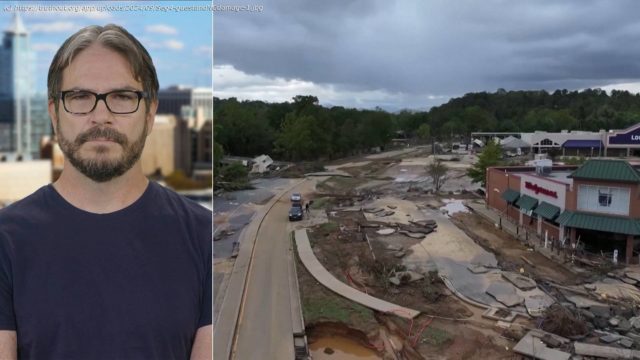The storm devastated large swaths of the southeastern US after making landfall in Florida as a Category 4 storm.
Hurricane Helene tears through the southeastern United States as scientists say climate change rapidly intensifies hurricanes. The storm devastated large swaths of the southeastern United States after making landfall in Florida as a Category 4 storm. Officials say the death toll is likely to rise, as many are still missing. Helene is expected to be one of the costliest hurricanes in U.S. history and was fueled by abnormally warm water in the Gulf of Mexico, but most of the media coverage has failed to connect the devastation to the climate crisis. “The planet’s overheating. It’s irreversible. It’s caused by the fossil fuel industry,” says climate activist and climate scientist Peter Kalmus in Raleigh, North Carolina. “This will get worse as the planet continues to get hotter.”
AMY GOODMAN: This is Democracy Now!, democracynow.org, The War and Peace Report. I’m Amy Goodman.
We end today’s show looking at Hurricane Helene. As the Category 4 storm tore through the southeastern United States, leaving nearly a hundred people dead and a trail of devastation, the storm triggered catastrophic flooding, tornado damage, downed trees, submerged entire neighborhoods in water across Florida, Georgia, Virginia, Tennessee and North and South Carolina. At least 30 deaths were reported in a single county in North Carolina, Buncombe County, where the city of Asheville has been cut off after the Swannanoa River crested six feet above previous records, flooding entire neighborhoods. Officials say the death toll is likely to rise, as many more are still missing. Hundreds of roads remain blocked by mudslides and standing water, hindering rescue efforts and the delivery of vital aid and supplies.
Meanwhile, more than 2 million customers remain without power as of Monday, while there’s limited phone and communications access. In North Carolina, city officials say Asheville residents may not have access to clean water for weeks, after Helene severely damaged its water treatment plant and piping system. Many state residents criticized officials for failing to share accurate information about the severity of the storm ahead of it making landfall.
Hurricane Helene made landfall Friday in Florida’s Big Bend, fueled by abnormally warm water in the Gulf of Mexico. On Saturday, Greenpeace posted on social media that, quote, “Hurricane Helene must be a wake-up call for climate justice.”
For more, we go to Raleigh, North Carolina, where we’re joined by Peter Kalmus, climate activist, climate scientist at NASA’s Jet Propulsion Lab. He’s speaking on his own behalf, not on behalf of NASA.
Peter, can you talk about the link between what has taken place in the southeastern United States and the climate catastrophe, climate change?
PETER KALMUS: Yeah. So, the planet’s overheating. It’s irreversible. It’s caused by the fossil fuel industry. And the reason I say “industry” specifically, not “fossil fuels,” is because this industry has been systematically lying and blocking action for almost 50 years, for decades and decades.
Home
United States
USA — Events Media Fails to Link Hurricane Helene to Fossil-Fueled Climate Change






